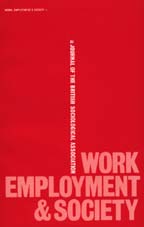No CrossRef data available.
Article contents
THE BUSINESS OF CONTINGENT WORK: GROWTH AND RESTRUCTURING IN CHICAGO'S TEMPORARY EMPLOYMENT INDUSTRY
Published online by Cambridge University Press: 01 December 1998
Abstract
The ‘temp’ industry is one of the fastest-growing employment sectors in the United States, though relatively little is known about the operations of its key institutional agents – the temp agencies themselves. In the paper, the restructuring of the temp industry and the role of temporary help agencies as ‘labour market intermediaries’ is critically examined. It is argued that not only is the industry growing at a rapid rate, it is also polarising, as some agencies ‘restructure down’ into the lowest-paid and most exploitative niches of the labour market – where employment instability is a daily phenomenon, while others ‘restructure up’ into increasingly long-term relationships – including ‘on-site’ management deals and ‘insourcing’ agreements – with major corporate clients. Likewise, ‘temping’ is not only becoming more commonplace, but the labour-market and workplace experiences of temporary workers are becoming increasingly heterogeneous. It is apparently in the nature of the industry that both these developments are scarcely ‘visible’, as restructuring down is often associated with ‘backstreet operators’, undocumented workers and unregulated work, while restructuring up draws agencies into increasingly seamless, reflexive and internalised relationships with corporations. The paper traces some of the labour market and organisational implications of these restructuring practices through an examination of the long-established but newly-vibrant temp industry in Chicago.
- Type
- Research Article
- Information
- Copyright
- © 1998 BSA Publications Ltd




